Oh yeah, it’s worth it. So let’s talk international.
If you want a quality business education at an accredited university, this post is for you! Learning how to do business is such a blessing, and attending school in a foreign country gives you a life-changing reorientation for maximum impact.
You get to understand how people and governments work together across cultures, develop skills to navigate the international business space, and of course you’ll have the delight of living in an unfamiliar land. If you can handle strong accents while learning new material, I can recommend no better experience than attending business school in Spain.
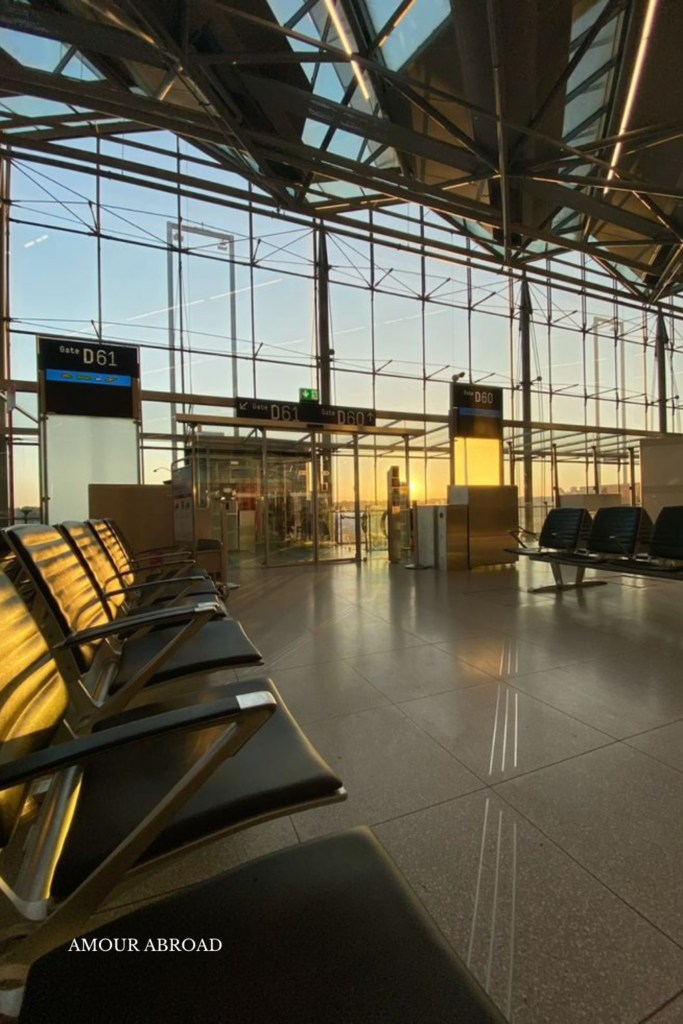
Here are the bonuses: Spanish schools are more affordable than American universities, grading is easier, and curriculum focuses on practical application over theory, so you get to go out and do as well as learn in a classroom setting.
Read on for the step-by-step process of getting to your international school!
Just Give Me My Money 🤌🏾🤌🏾
First things first, start saving! You know this of course, and probably have a little tucked away, but I mean to get intentional. Most business schools in Spain cost 14,000 to 40,000 Euros per year. For my school, the Global Business School of Barcelona, I paid the equivalent of $17,000 for the entire program, which was three semesters and included a mini Excel course just for MBAs two weeks before the rest of classes began.
Cost of Living
One of the best things about Spain is the super low cost of living. You can expect your rent to stay below $1,500; a trip to the grocery store is 40 – 60 Euros if you’re cooking at home and restocking your pantry like I was. Food and entertainment are exceptionally low priced as well: 5 Euros for coffee and drinks, 30 Euros for a full meal at rooftop restaurant including drinks and dessert, and bar covers at less than 10 Euros.

Finally, excursions around Spain and Europe cost anywhere from 30 to a few hundred Euros and are offered through third parties that collaborate with the schools. Prices change based on the type of excursion – a day trip to Andorra will cost 30 Euros, a weekend ski-trip to Andorra will cost a few hundred. Traveling on your own is around the same, plus costs for transportation that you’ll cover yourself.
In total you’ll need anywhere from $20,000 to $40,000 for living expenses, plus the price for your school. Compared to my bachelor’s degree at Baylor University which was $250,000 just for tuition, school abroad was much more affordable!
Financial Aid
Check here to see if your school accepts financial aid! Many schools work with the U.S. Education department to allow for financial assistance, but it takes time to process, so do this first. Private schools like my alma mater usually don’t, so keep that in mind while researching your university!

My secret was that I started saving my tips from Olive Garden the summer before I started applying. I invested in stocks like Apple and Tesla, which allowed them to snowball into $7000 over 10 months. While that was growing, I saved my income from working and day trading.
By the time I was accepted, I was already able to cover most of my tuition and the first month of rent! I paid the first half of tuition in the summer before I started my visa process and took out a $20,000 loan for the rest of my expenses. It was smooth sailing from there!
Quick Financial Tips
You may want to consider learning a new money making skill before you go! You could start a creative project like a blog or a YouTube channel, or learn how to trade options, which is what I did on slow days to earn extra spending money. Business school is the perfect place to start a side hustle!
Additionally, going to school in Europe means dealing with exchange rates! The Euro is usually worth more than the Dollar, so be prepared to spend a little more than you expected.
Finally, most advanced European countries accept American credit and debit cards. Check with your bank for different transaction fees!

Find Your School!
Time for the fun part: Finding your school! Barcelona has an abundance of great business schools, and many carry American accreditations for those who want to return home to work.
Make your search as simple as possible by writing down what you want from your school:
– Location
– Class size
– Majors
– Learning style (do you prefer theory or practical application?)
– Tuition & fees
– Accreditations
Narrow down your options with these criteria and you’re guaranteed to find the perfect fit!
Apply
Just do it.
Don’t take any time to convince yourself that you’re doing the right thing – you are. Sit down at your computer, write out your mission statement, and get to submitting! Business schools in Europe do not require a GMAT. Once you have all your transcripts and letters ready, your initial application can be completed in an afternoon.
Be sure to get familiar with your chosen schools’ application timelines. Some may require applications to be submitted in the fall like American universities, but some do rolling admissions, which means they accept applications at any time. Check with your school!
How to Ace your Business school Interview

Ah, yes. The dreaded business school interview.
Don’t stress. They don’t expect you to be perfect!
Here are my tips for acing your interview:
1. Practice!
Business rests on the art of communication, so first things first, you must get in the habit of expressing yourself well under pressure. Be able to speak clearly and swiftly as you won’t have much longer than 45 minutes. Learn how to smile, be calm and answer the question.
2. Write down your 5 W’s and How!
a. Who inspired you and who you hope to impact with your business
b. What you want to provide for humanity
c. When you want to implement your plan (be optimistic)
d. Where you want to base your operations and where you hope to make the greatest impact
e. Why business and not another sector
f. How you’re going to do it
3. Get in the mindset of a business person!
Think of your interview as an investor’s meeting, because it is. You’re asking this school to invest its time, resources and network into you and asking its country to trust you on the promise that in 5 to 10 years they’ll get a return in your success. Both want to be able to point to you as an example of the quality of their education and culture.
In return, they are asking you for your money, your loyalty, and the rights to mold your future. Both of you are there to ensure that you are the right fit for one another.
4. Get comfortable!
This might be a bit obvious, but trying too hard is the surest way to kill your application in the crib. Make yourself as comfortable as you can – meditate beforehand, choose an outfit that feels good and is easy to move around in, and if your interview is remote, find a calm location to conduct it in. Set yourself up so that you can show your best and most professional side!
If you follow these steps, you’ll be a shoe-in!
Visa Process
Note: This visa process applies to US citizens only. For help on how to apply for visas in your country, click here.

Your school will provide you with all of the visa support you need. Admissions departments walk students through the visa process step by step and will absolutely do a Zoom session if required! Should you run into roadblocks and can’t get your visa in time, they’ll happily accept you a little later – everyone has visa problems!
Tips for Visa Applications
- Do your FBI Background check and/or apply for your passport first. These two take the longest to process, the background check taking anywhere from 2 to 12 weeks. You’ll also need to get the FBI Background check certified with an Apostille, which is essentially an international notarization. Give yourself peace of mind by taking care of these two first! To get your Apostille expedited at a low cost, use Monument Visa Services!
- Your school will send all of the required documents for the proof of admission in the mail: your certificate of matriculation, class schedule, class start and end dates, proof of tuition payment and more. Be sure to make 2 copies of everything.
- Check your consulate’s website for news; they often change when they’ll accept your documents, sometimes requiring that everything be turned in within a few weeks, so make sure you stay updated!
- Gather all your documentation and send it in!
- Do not worry! Eventually you’re gonna board the plane, land in your new city, walk into your beautiful apartment and meet your new classmates. It’s all gonna work out, I promise.
Visa Tips
Make sure to set aside money for processing. You’ll need a few hundred dollars to be safe – up to $700 if you need to expedite anything. Start as soon as possible and keep in contact with your school to reduce costs.
Stop by your consulate if you have questions! The employees know what works the fastest. And yes, consulates do answer emails. Find your person and lean on them when you need to!
My process took about 5 weeks: from the middle of June when I started gathering documents to the last week of July, which was the only time the consulate was accepting applications. You can start earlier if you need to, but remember that some of these (like the FBI Background check) require that you get them within 1 to 3 months of sending your application to the consulate, so don’t start too early!

Securing an Apartment
Welcome to the jungle baby.
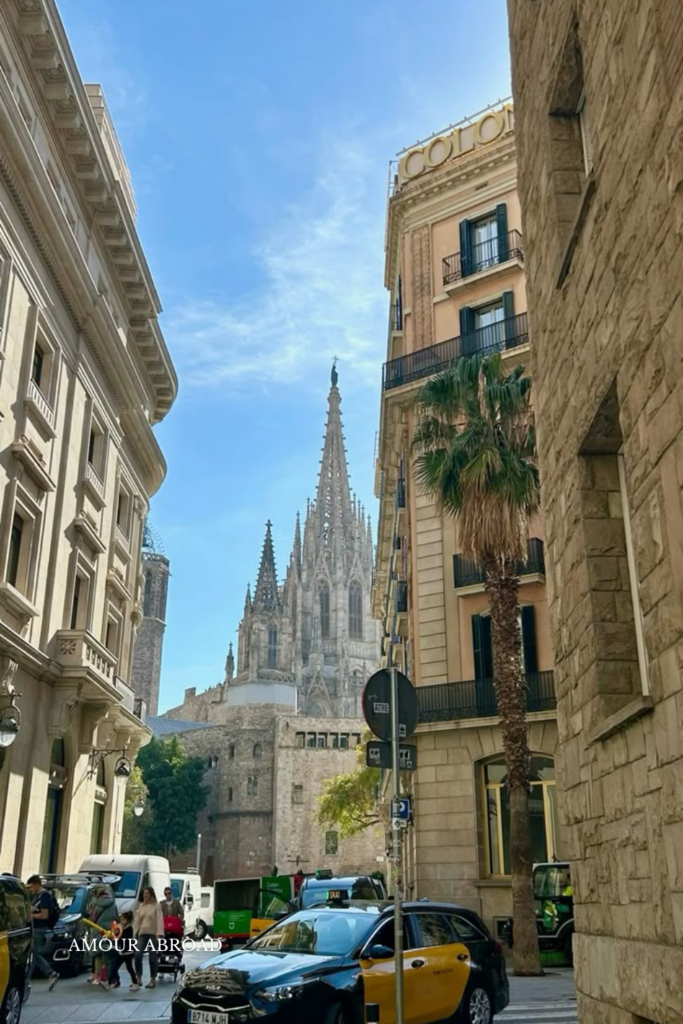
If you know, you know – hunting for an apartment during study abroad season is an actual gladiator fight. I’m kidding of course; you’ll never have to argue or wrestle for a place. But they do get rented quickly no matter which city you’ve chosen, so you have to move quick!
The best kept rental secret is Idealista. They showcase an assortment of apartments that fit every aesthetic, from Renaissance to modern eclectic.
You’ll find most of the good apartments when you land, but surfing Idealista and learning about the different areas is a fun headstart. Spanish cities are often broken up into neighborhoods that have their own flavor. For example, Eixample is the business district of Barcelona and is where most of the business schools in the city are located – some just a few feet apart. It’s beautiful and located just a few blocks away from the main roads, Avinguda Diagonal (the business street) and Passeig de Gracia (the high fashion street). It’s the perfect place if you’re like me and want to be centrally located in a bougie, family-friendly area.
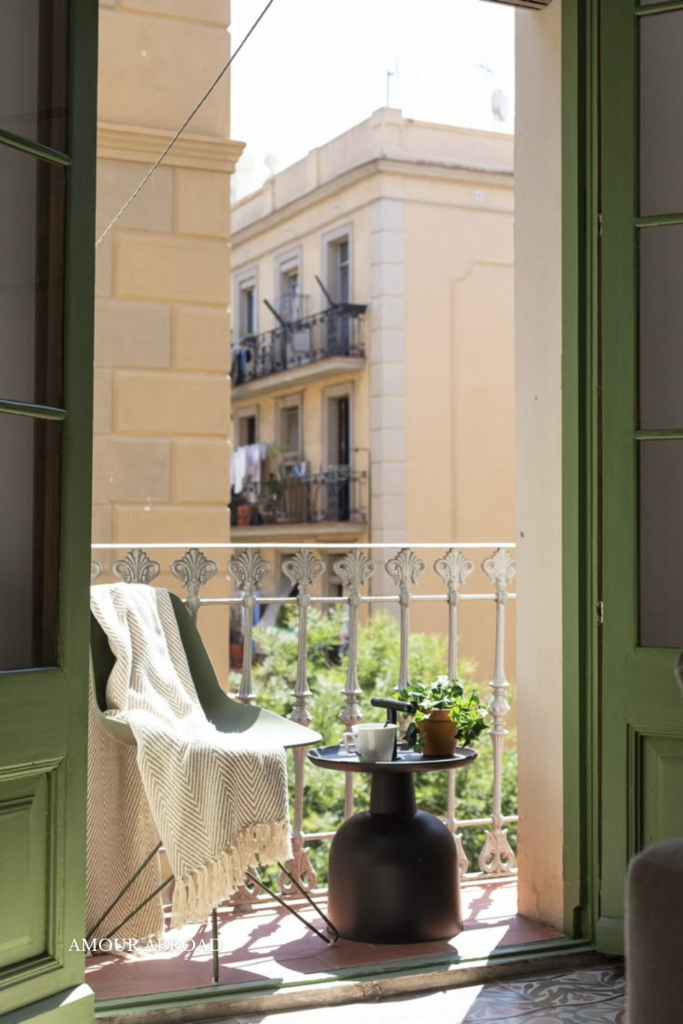
Other neighborhoods include Barceloneta (the beach district), El Gotico (the historical district), and Gracia (where the rich families live), to name a few. Get familiar with the towns you’re interested in and find your vibe!
Housing Tips
Here’s the biggest tip I can give you about house hunting in Spain: be prepared to stay in an AirBnB, a hotel or with family and friends for the first two months. It probably won’t take that long, but every study abroad student is going through the same agencies to find their spot, so when you find your place, sign for it.
My roommate and I had already started classes – we were on Zoom at the Starbucks for our after hours Excel course when we found our apartment online. And the best part? The rental agency was around the corner. As soon as class was over we ran to the office, smiled and shook the agents hands, and by the end of the day the apartment was ours, praise God!
You might have to hustle, but it’s so fun, and with a little faith you’ll find the perfect place.
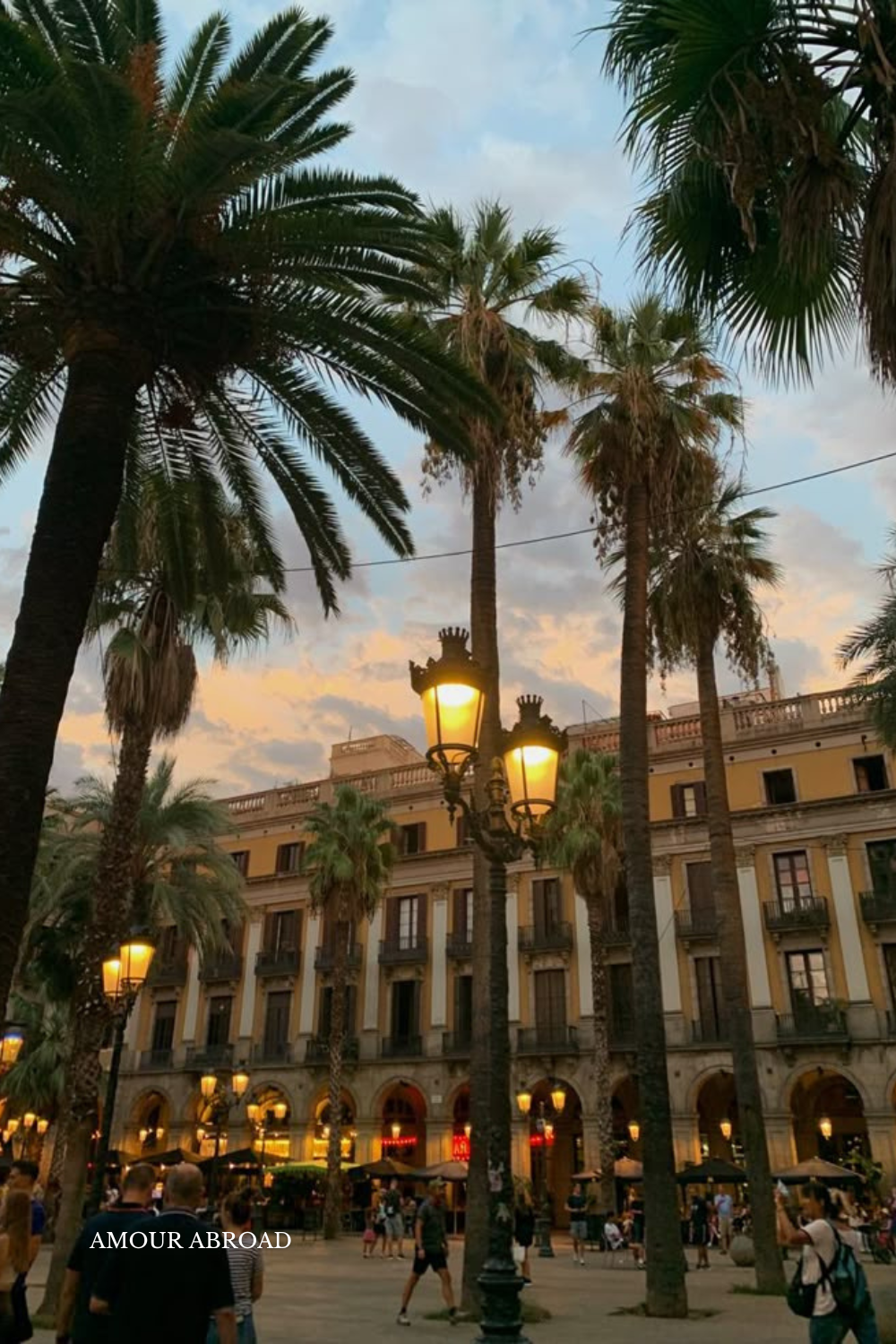
Also, this might be a bit obvious, but do not sign a lease without meeting the agent in person. International student arrivals are a season in foreign cities. In other words, your schools are not the only ones who know your situation. It’s easy for desperate students to get scammed! Avoid this by only working with reputable rental agencies like aTemporal or shBarcelona.
Book your Flight!
Here we are, the final step. You’ve been accepted to your school. You paid the tuition and received your brand-new passport and visa in the mail. You’ve scheduled a few apartments tours. You’ve met some of your new classmates on social media, and soaked in the feeling of your dream coming true.
Only thing left to do is buy your plane ticket.
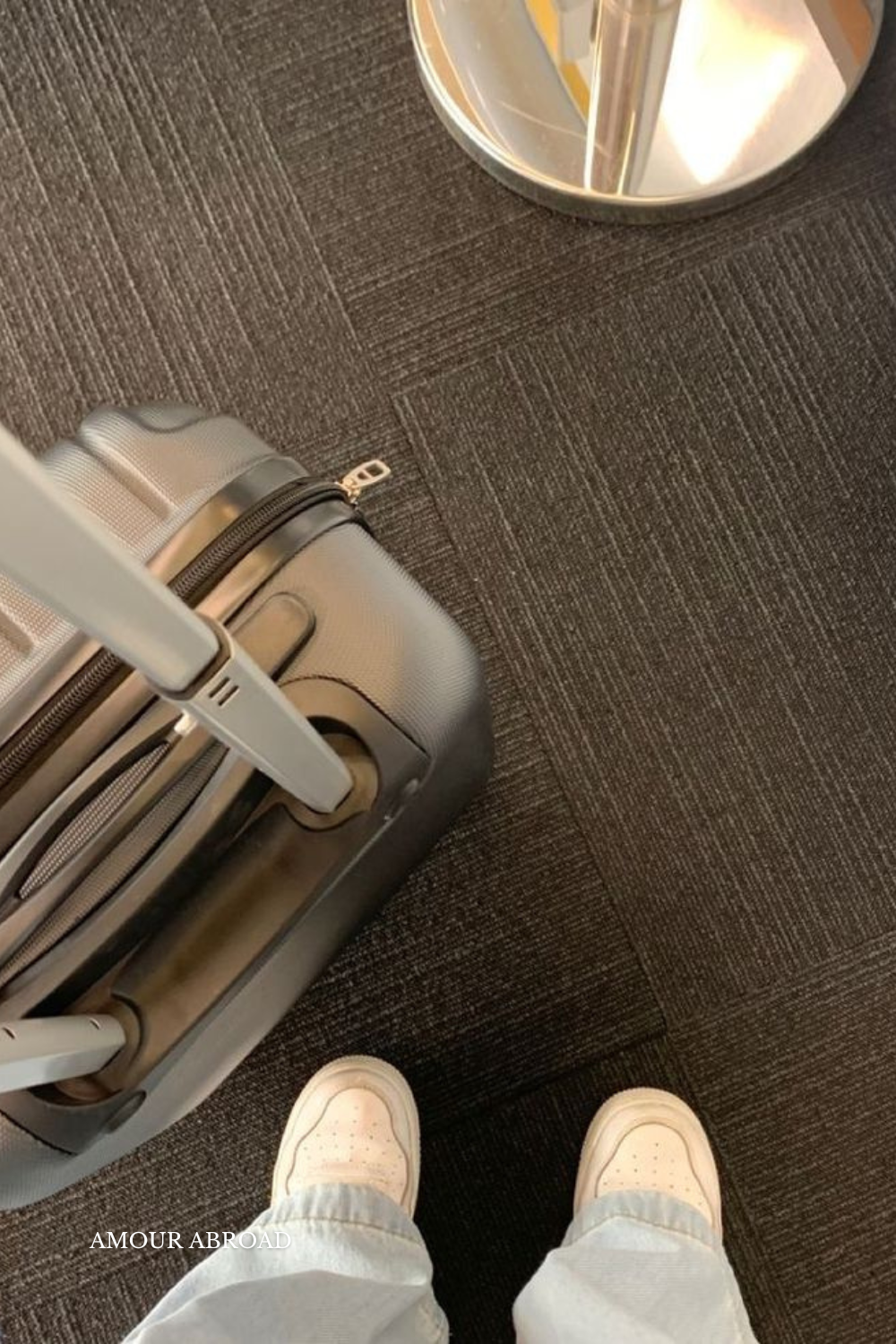
If you’re flying from the Midwest or East Coast, you’ll only be in the air for 6 to 8 hours. I had taken a week long trip to Europe earlier that summer, so it was a quick trip for me. In other words I didn’t care where I sat, so I took a seat at the back of the plane.
However you want to travel is up to you! My only advice is:
- Book your flight with enough time to adjust. It’s a new time zone, new language, and new ingredients, so give yourself time to get comfortable before class starts.
- Don’t stress too much about your seat! What’s important is that you make it to your destination safe and sound.
- Bring an overnight bag! RyanAir flights are famously cheap – once I was able to get a €28 ($35) ticket to Ibiza! Use your bag as a carry-on and reuse it when you’re ready to travel around Europe. Need a new one? Buy my overnight tote in Amour Abroad’s Etsy shop!
Are You Ready? How to Pack + Packing List
As soon as book your flight, practice packing! You’ll end up downsizing a lot while you prepare, so figure out what you need, what fits and what doesn’t before time runs out.
Download my expert packing list here:
Tips & Tricks
- Pack light! Trust me, you’ll do plenty of shopping once you’re there.
- Remember your adapters! You can find them around town, but I found it simpler to just order some on Amazon before I left. (I got electric toothbrush chargers, phone chargers, etc.)
- Secure your money! If you need help from home, family can send you transfers on apps like CashApp and Revolut. If it’s cash you need, they can send it to the thousands of Western Unions in Spain.
- Unlock your phone! You can’t get a Spanish SIM card unless your phone is unlocked. Your carrier will have specific instructions on how to do it.
- Don’t worry much about dressing professionally. One of the beautiful things about Spanish business schools is that the laid back culture shows up in everything. And that includes how class is taught! Don’t stress about how you dress. Remember, networks grow through character, not appearances!
- Go in with the utmost humility. I promise, it will save you so much embarrassment. I can’t tell you how many times I watched people argue about how they thought things would work. It was awkward for everyone when they found out that Spanish do things their own way. Before you land, chant to yourself I am ready to learn! Be receptive to the idea that you might be wrong!
- Develop some peace-finding habits now! Living in another country is stressful. So take time to start meditating and journaling, that way you can enjoy your experience without problems!
That’s All Folks!
Thanks for reading this post, and good luck to you all. You’ll be accepted into the perfect school and have the most amazing time, so start celebrating now! You can do this!
Ask your questions in the comment section below for more info.
I love you!
Buy a journal for your travels in the Amazon bookstore!







Leave a Reply